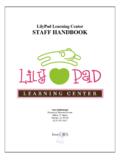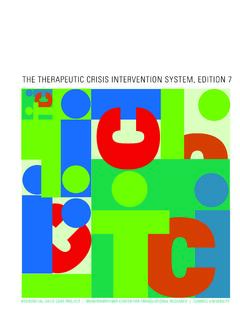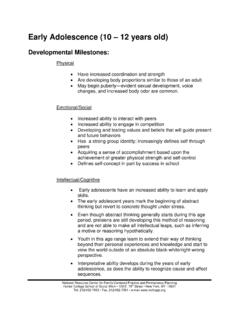Transcription of A REVIEW OF RESEARCH ON THE EFFECTS OF EARLY …
1 1 A REVIEW OF RESEARCH ON THE EFFECTS OF EARLY CHILDHOOD EDUCATION AND CARE (ECEC) ON CHILD DEVELOPMENT Edward Melhuish Katharina Ereky-Stevens Konstantinos Petrogiannis Anamaria Ariescu Efthymia Penderi Konstantina Rentzou Alice Tawell Paul Leseman Martine Broekhuisen 2 Contents Executive Summary .. 3 Introduction .. 6 ECEC RESEARCH in historical perspective .. 6 ECEC as an intervention for children from disadvantaged 8 US studies of ECEC as an intervention for children from disadvantaged 8 ECEC for children 0-3 years.
2 8 ECEC for children 3+ years .. 12 Miami School Readiness Program .. 19 The Miami School Readiness Program .. 19 European studies of ECEC as an intervention for children from disadvantaged backgrounds .. 22 Randomised Control Trials (RCTs) .. 22 Quasi-experimental 23 Summary of evidence for disadvantaged children .. 26 ECEC for the General 27 Attendance patterns of care .. 27 Attendance and quantity of child care .. 27 The search for the ideal starting age, duration and intensity of attendance .. 38 Centre-based versus home-based attendance of 41 Variation in the quality of 44 Positive relationships and interactions between practitioners and children.
3 48 Pedagogical practices and curriculum .. 51 Stability and continuity of care .. 57 The physical environment .. 58 Adult-child ratios and group sizes .. 59 Practitioner qualifications and training .. 62 Complex pathways from ECEC to child outcomes .. 65 The interaction of attendance of ECEC with family and child 67 The interaction of quality of ECEC with family and child characteristics .. 71 Conclusion .. 75 Summary of evidence for disadvantaged children .. 75 Summary of evidence for the general 76 Characteristics of EARLY years provision and child development.
4 77 Complex pathways in child 77 Policy relevance .. 77 References .. 79 3 Executive Summary This report considers international RESEARCH on the impact of EARLY childhood education and care (ECEC) provision upon children s development and, while not exhaustive, is an extremely comprehensive REVIEW , using studies reported from a wide range of sources including journals, books, government reports and diverse organisation reports. EARLY RESEARCH was primarily concerned with whether children attending non-parental care developed differently from those not receiving such care.
5 Later work recognised that childcare is not unitary and that the quality or characteristics of experience matters. Further RESEARCH drew attention to the importance of the interaction between home and out of home experience. High quality childcare has been associated with benefits for children s development, with the strongest EFFECTS for children from disadvantaged backgrounds. There is also evidence that negative EFFECTS can sometimes occur. The results of studies partly depend upon the context and ECEC systems in place in different countries, but there is sufficient commonality of findings to indicate that many results are not culture-specific.
6 While the RESEARCH on pre-school education (three+ years) is fairly consistent, the RESEARCH evidence on the EFFECTS of childcare (birth to three years) has been equivocal with some negative EFFECTS , some null EFFECTS and some positive EFFECTS . Discrepant results may relate to age of starting and also differences in the quality of childcare. In addition childcare EFFECTS are moderated by family background with negative, neutral and positive EFFECTS occur depending on the relative balance of quality of care at home and in childcare.
7 Recent large-scale studies find EFFECTS related to both quantity and quality of childcare. The effect sizes for childcare factors are about half those for family factors. The analysis strategy of most studies attributes variance to childcare factors only after family factors has been considered, and, where the two covary, this will produce conservative estimates of childcare EFFECTS . Summary of evidence for disadvantaged children The evidence on ECEC in the first three years for disadvantaged children indicates that high quality ECEC can produce benefits for cognitive, language and social development.
8 Low quality childcare produces either no benefit or negative EFFECTS . High quality childcare with associated home visits appears to be an effective package of services. With regard to provision for three years onwards disadvantaged children benefit particularly from high quality pre-school provision. Also children benefit more in socially mixed groups rather than in homogeneously disadvantaged groups. A number of interventions have shown improvements in cognitive development, but in some cases such benefits have not persisted throughout children s school careers.
9 This appears to be partly because subsequent poor school experiences for disadvantaged children overcome earlier benefits from high quality ECEC experience. However EARLY childhood interventions do boost children s confidence and social skills, which provides a better foundation for success at school (and subsequently in the workplace). Reviews of the RESEARCH often infer that it is the social skills and improved motivation that lead to lower levels of special education and school failure and higher educational achievement in children exposed to EARLY childhood development programmes.
10 However there is clear evidence that cognitive, language and academic skills can also be enhanced by ECEC experience and these are likely to play a role in the later educational, social and economic success that is often found for well-implemented ECEC interventions. Studies into adulthood indicate that this educational success is followed by increased success in employment, social integration and sometimes 4 reduced criminality. There is also an indication of improved outcomes for mothers.







